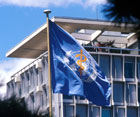WHO consultation on global alcohol strategy and the way forward
The World Health Organization (WHO) Global strategy to reduce the harmful use of alcohol was endorsed at the World Health Assembly in 2010. After nearly 10 years of implementation WHO is now consulting on the way forward and is inviting civil society to make submissions in an online consultation.
The World Health Assembly (WHA) in May 2019 requests the WHO Director-General to “to report to the Seventy-third World Health Assembly in 2020, through the Executive Board, on the implementation of WHO’s global strategy to reduce the harmful use of alcohol during the first decade since its endorsement, and the way forward”. During the last couple of months, a consultation has been going on with the WHO Member States. Now the civil society and other so called “non-state actors” are invited to answer questions about the most important achievements and setbacks during the last ten years and about priority areas for future actions.
As part of the consultation process WHO has issued a discussion paper outlining the implementation of the global strategy and opportunities for the way forward. It outlines activities by WHO including different events, producing the Global status report on alcohol and health, development of the technical package SAFER together with partners and more.
The report points out that there is no progress in reducing the total per capita alcohol consumption in the world in comparison with 2010, but developments around the world vary a lot. The global situation regarding alcohol policy has improved somewhat, but the report observes that it is still far from accomplishing effective protection of populations from alcohol-related harm. The section on “Challenges” is abundant with examples of how efforts to reduce alcohol related harm meet social norms, significant influence by alcohol industries, trade agreements, new forms of global marketing and lacking technical expertise in many countries. This section also outlines that alcohol remains the only psychoactive and dependence producing substance with significant global impact on population health that is not controlled at the international level by legally binding regulatory frameworks. Still the section of the way forward stops short of pointing to the need for such a framework, similar to the Framework Convention on Tobacco Control (FCTC).
The need for a Framework Convention on Alcohol Control (FCAC) has been the main aspect of a position paper released by the Global Alcohol Policy Alliance (GAPA) in conjunction with the WHO online consultation. It concludes that there is a need for a process leading to endorsement of a global legally binding treaty on alcohol in order:
-
to counterbalance effects of international trade and economic treaties on alcohol control policy
-
to negotiate a strong symbolic statement, denormalising alcohol
-
to foster international cooperation in controlling the alcohol market including the marketing of alcohol in the digital ecology;
-
to create an intergovernmental forum, and a secretariat with resources to facilitate implementation of the best buys including standards on taxation; on control systems limiting times and places of sale and service; and on all forms of marketing
-
to provide a clear statement of limits on the role of economic operators, as in Article 5.3 of the FCTC.
Says Sally Casswell, Chair of GAPA, “we encourage civil society to make submissions in the online hearing and to bring their experience and point of view forward. We also seek support for a call to the Director General of the World Health Organisation to investigate, in consultation with Member States and civil society (without conflict of interest), the necessity and feasibility of an international legally binding treaty to reduce the harmful use of alcohol.”
The deadline for the WHO consultation is 4 November.
RELATED ARTICLES
- SAAPA applauds WHO position on no industry collaboration
- SAFER – a new WHO initiative to boost national alcohol policy processes
- UN High-Level Meeting on NCDs misses the target
- WHO Launches Global status report on alcohol and health 2018
- Bolder actions needed to reverse the tide of NCDs and mental disorders
- New resource tool on alcohol taxation from WHO
- Alcohol brought up in WHA NCD debate
- WHO Americas publishes alcohol and health report
- Integrating national policies on the harmful use of alcohol, gender-based violence and HIV
- Number of premature and avoidable NCD deaths on the rise

